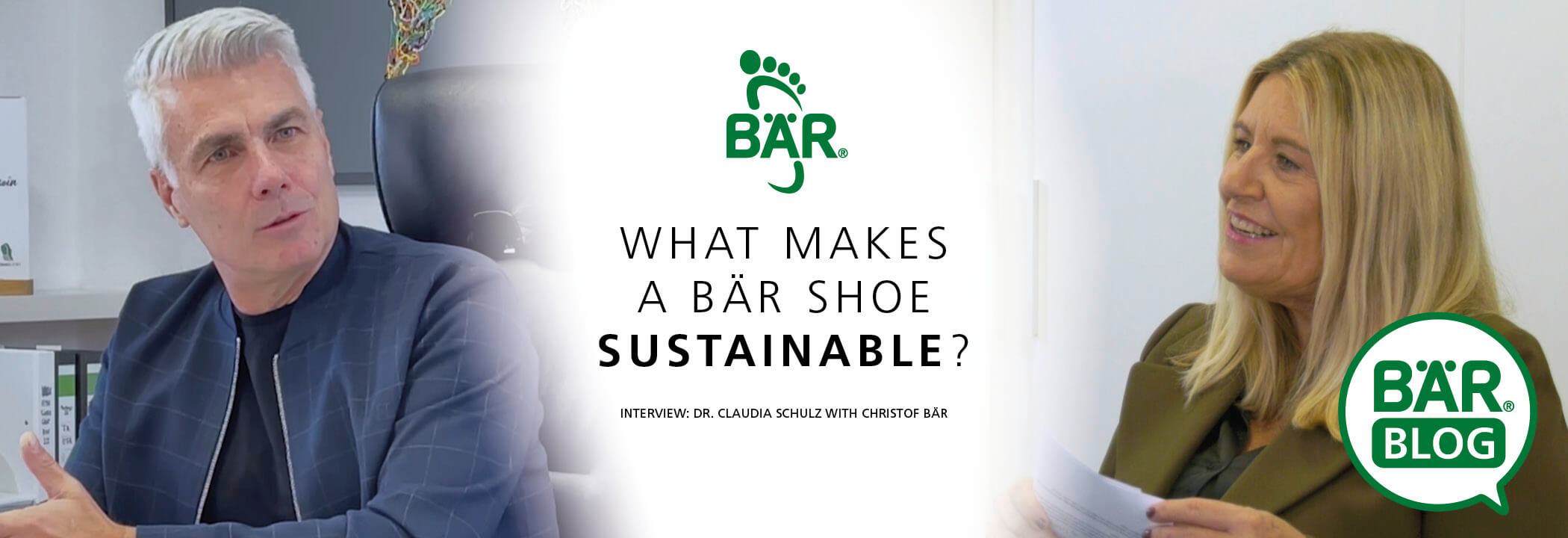Interview: What makes a BÄR shoe sustainable?

Watch the interview live on YouTube or read the full story here. Find out how BÄR deals with sustainability!
INTERVIEW BETWEEN DR. CLAUDIA SCHULZ AND CHRISTOF BÄR:
Dr. Claudia Schulz: We have always talked a lot about sustainability at BÄR Schuhe and I think it's fair to say that BÄR is also a protagonist when it comes to sustainability, when nobody was talking about sustainability yet. Similar to barefoot shoes, where I would also say - I don't know if you are the inventor - but you are at least at the forefront, I would also say that you are also among the best practice examples when it comes to sustainability. Nevertheless, I would like to ask you again, what makes BÄR particularly sustainable? You've just said it: firstly, we make sure that we don't offer too many new models or too many innovations in our model selection and product range; instead, we offer classic models with corresponding innovations. But when I think of sustainability, I also think of issues such as production and material selection. Perhaps you could give a few examples of what makes BÄR sustainable?
Christof Bär: Yes, it has always been important to us that we don't change the world on our own. We won't be able to do that and it's not our job, but what we can contribute to the topic of sustainability, in order to simply avoid leaving our world worse than we found it, is of course a core factor in a family business to say "I want to do something, I want to hand it over in such a way that I don't just put it somewhere and say do what you want, but it should be something that really contributes to enjoying nature. We can only preserve nature if we don't exhaust it and just use it up, and of course there are always various issues that are important to us. Firstly, that the product lasts a long time. Because any product that doesn't have to be produced is the most sustainable. Our shoes last longer and when the soles have worn out, the customer can have the shoes resoled. And then with the components that have worn out. You don't replace the whole car when the tires are worn out, you just replace the tires. This is possible with our shoes thanks to the high-quality materials and the workmanship, which means that the upper is durable and can be worked on many times and that the wearing parts, in this case logically the sole, can be easily replaced. And we do this at the local shoemaker, because it is very important to us that we do not send more goods back and forth to replace a small piece of sole on a worn heel. We promote the fact that the local cobbler is recommended by the stores, which also creates a certain local community.
Dr. Claudia Schulz: So here again with local partners, very good. I think this partnership concept is very important, because it is of course also an advantage for the retailer. If they can still find the shoemaker - but many companies in this sector still have their own shoemakers in-house or on site.
Christof Bär: That is precisely the contact situation. The more contact you have with the brand, the better. We see that again and again. We also talk to local shoemakers who confirm that BÄR shoes are really well made and that it's fun to work on the shoe. And then they recommend us again, which is also very important for the retailer, because we stand by our product and any doubts about including the shoes in the range are completely unfounded. Because even experts recognize the value and that is what is naturally transferred to the customer. Apart from the natural crepe soles that we use, which are really processed without leaving any residue and which are then also produced from the natural product, i.e. really controlled sustainable behavior. The trees that produce the latex milk are really controlled, just like the forestry here in our region. So we also replant what is necessary, we really make sure that it is preserved in the long term.
Dr. Claudia Schulz: Does that mean you have an overview? You know exactly what is delivered when and where, from which factories, which means they are probably certified, as you imagine?
Christof Bär: They are certified. We have complete control of the supply chain, from the idea to production and the end customer, and can therefore really guarantee that we know where the materials come from and how they are processed. We also set ourselves high standards by carrying out audits in accordance with the normal standards anyway and always asking ourselves what we need to achieve in terms of the environment or, in particular, in terms of energy reduction. For example, we switched to photovoltaics a long time ago, both in our production and here. We therefore produce over 50% of our energy requirements using photovoltaics, which means that we have already reduced our footprint by 50%. When tanning the leather, we work with tanneries in accordance with the LWG (Leather Working Group) Gold Standards for upper leather, and we use terracare leather specifically for our mountain hiking boots. This material is produced in a way that conserves energy and resources. It is nevertheless waterproof, with high standards of durability and function. For the lining leathers, we work almost exclusively with chrome-free tanned lining leathers that no longer use heavy metals in the tanning process. This allows us to offer our customers a natural product, which means that people with chrome allergies can wear a BÄR shoe with complete satisfaction thanks to chrome-free tanning.





